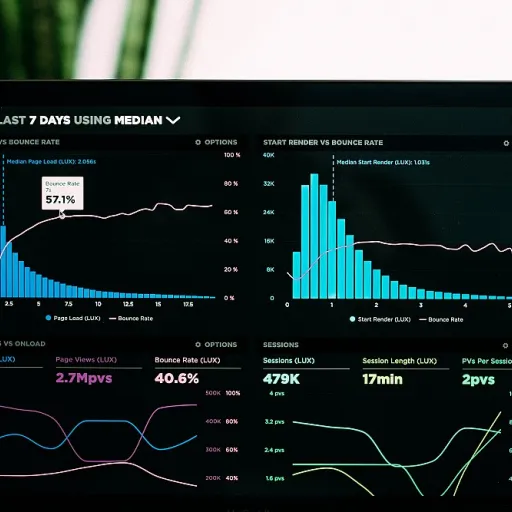
Understanding the value hypothesis in AI-powered SEO
Defining the Value Hypothesis in AI SEO
In the context of AI-powered search engine optimisation, the value hypothesis is a foundational idea that predicts how a product or service will deliver value to its target audience. This hypothesis is not just a guess; it is a testable statement about what users need and how your business can meet those needs through its product or content. The value hypothesis helps guide product development, content strategy, and SEO efforts by focusing on what will actually resonate with customers and drive conversion rates.
Why Value Hypothesis Matters for SEO
AI-driven SEO strategies rely on a clear value proposition to attract and retain users. By formulating a strong value hypothesis, businesses can align their content and optimisation efforts with what users are searching for and what will help them solve their problems. This approach is essential for improving user experience, increasing engagement, and boosting rankings in search results. The value hypothesis also supports the hypothesis framework, which is used to structure experiments and measure verifiable value through data and customer feedback.
- Product value: Identifying what makes your product or service unique in the market.
- Customer feedback: Using real user feedback to refine your value proposition and test hypotheses.
- Hypothesis testing: Running experiments to validate whether your content or product meets the needs of your target audience.
- Growth hypothesis: Exploring how delivering value can lead to business growth and improved conversion rates.
Connecting Value Hypothesis to AI SEO Processes
AI tools can analyse large volumes of data to identify patterns in user behaviour, search intent, and market trends. This analysis helps businesses form and test hypotheses about what content or product features will deliver the most value. For example, AI can help segment users, identify high-potential keywords, and suggest content improvements based on user feedback and performance metrics. These insights feed into the ongoing process of hypothesis testing and product management, ensuring that SEO strategies are always aligned with customer needs and business goals.
For a deeper look at how AI is transforming SEO strategies in specific industries, you can explore this case study on AI in travel SEO.
How AI interprets and tests value hypotheses in SEO
AI’s Approach to Hypothesis Testing in SEO
When artificial intelligence is applied to search engine optimisation, it transforms how businesses test and validate their value hypothesis. AI systems analyse large volumes of data from user interactions, search trends, and conversion rates to identify what resonates with the target audience. The process begins with a clear hypothesis about the product or service’s value proposition—what will help customers and drive business growth. AI then enables rapid, data-driven experiments to test these hypotheses in real time.
- Automated Experiments: AI tools can run multiple SEO experiments simultaneously, adjusting keywords, content, and page structure to see which combinations deliver the most verifiable value to users.
- Continuous Feedback Loops: By monitoring user feedback and engagement metrics, AI refines its understanding of what product value means for different customer segments.
- Hypothesis Frameworks: AI supports structured hypothesis testing, helping product management teams validate business ideas and growth hypotheses more efficiently.
From Data to Actionable Insights
AI-driven SEO strategies rely on a feedback-rich environment. Every change made to a website or content is tracked for its impact on user behavior and conversion rates. This data-centric approach helps businesses test their value proposition with real users, ensuring that the product or service aligns with market needs. For example, AI can analyse which landing pages convert best, or which keywords attract the most qualified traffic, providing actionable insights for product development and business model refinement.
AI also helps in segmenting the target audience and personalising content, making it easier to test different value hypotheses across user groups. This level of granularity was difficult to achieve before the integration of AI in SEO.
For a deeper look at how AI is transforming specific industries, consider how local SEO can boost hotel bookings with artificial intelligence. This example highlights the practical application of hypothesis testing and value proposition refinement in a real-world context.
Iterative Testing for Continuous Improvement
The strength of AI in SEO lies in its ability to iterate quickly. Hypotheses about product value or customer preferences are not static; they evolve as new data comes in. AI enables ongoing hypothesis testing, helping businesses adapt their strategies based on real-time customer feedback and market shifts. This iterative process supports better product service alignment, higher conversion rates, and ultimately, more sustainable business growth.
Challenges in defining value for SEO with AI
Defining Value in the Context of AI and SEO
One of the main challenges in applying a value hypothesis to AI-driven SEO is the complexity of defining what "value" truly means for both the business and its customers. In traditional product management, value is often tied to clear metrics like conversion rates, user engagement, or revenue. However, in SEO, value can be more abstract and multifaceted. For example, is value measured by increased organic traffic, higher rankings for target keywords, or improved user satisfaction? Each business idea and product service may require a different approach to hypothesis testing and value proposition development.
Data Quality and Interpretation Issues
AI relies heavily on data to test hypotheses and optimize for product value. But the data available for SEO experiments can be noisy, incomplete, or lagging. This makes it difficult to validate a hypothesis framework or verify the impact of a new SEO strategy. For instance, changes in search engine algorithms or shifts in market trends can skew results, making it hard to attribute improvements to the tested hypothesis or product development efforts. The challenge is to ensure that the data used for hypothesis testing is both relevant and timely, so that the AI can accurately assess the value proposition for the target audience.
Aligning AI Objectives with Business Goals
Another challenge is aligning the AI's optimization objectives with the broader business model and customer needs. AI systems may optimize for what they "think" is valuable based on available data, but this may not always match the actual needs of users or the intended product value. For example, an AI might prioritize traffic growth (a growth hypothesis) over conversion rates, missing the real business objective. Regular customer feedback and user feedback are essential to ensure that the AI's actions support the business's value hypothesis and deliver verifiable value to customers.
Testing and Iteration Constraints
SEO experiments often require time to yield meaningful results, which can slow down the hypothesis testing process. Unlike rapid product development cycles, SEO changes may take weeks or months to reflect in search rankings and user behavior. This delay complicates the process of validating hypotheses and refining the value proposition. Businesses must balance the need for quick iteration with the realities of SEO timelines, using a hypothesis framework that accounts for these constraints.
For a deeper look at how AI is influencing the way businesses approach value and customer impact in marketing, you can explore this analysis of AI's impact on consumer-focused marketing.
Practical examples of value hypothesis in AI-driven SEO
Real-World Scenarios: Applying Value Hypotheses in AI SEO
When businesses use artificial intelligence to shape their SEO strategies, the value hypothesis becomes a practical tool for decision-making. It helps teams clarify what product or service value they believe will resonate with their target audience. AI-driven SEO platforms can accelerate the process of testing these hypotheses, allowing for rapid experimentation and data-driven adjustments.
- Testing new product ideas: Suppose a company wants to launch a new product feature. The value hypothesis might state that adding this feature will increase conversion rates among a specific customer segment. AI tools can analyze user behavior, search trends, and feedback to validate or refute this hypothesis by monitoring changes in organic traffic and engagement.
- Optimizing value propositions: AI can help refine a business’s value proposition by analyzing which messaging resonates most with users. By running A/B tests on landing pages or product descriptions, AI can identify which hypotheses about customer preferences lead to higher engagement and better SEO performance.
- Personalizing content for target audiences: AI models can segment users based on behavior and demographics, then test different content hypotheses to see which versions deliver the most value. For example, tailoring blog content to address specific customer pain points can be tested for impact on dwell time and conversion rates.
- Feedback loops for continuous improvement: AI-driven SEO strategies often include mechanisms for collecting and analyzing customer feedback. This data helps refine the initial value hypothesis, ensuring that product development and SEO efforts stay aligned with real user needs.
How AI Experiments with Hypotheses in SEO
AI systems can automate the process of hypothesis testing in SEO by running multiple experiments simultaneously. For example, they might test different meta descriptions, product page layouts, or calls to action to determine which combination delivers the most verifiable value to users. This approach helps businesses quickly identify what works and what doesn’t, reducing the time and resources spent on ineffective strategies.
| Scenario | Value Hypothesis | AI-Driven Test | Outcome |
|---|---|---|---|
| Launching a new product service | Users will find the new service valuable and engage more | AI tracks engagement metrics and user feedback | Improved conversion rates or need for adjustments |
| Changing website structure | Better navigation will help users find value product faster | AI analyzes click paths and bounce rates | Higher retention or further optimization needed |
| Testing content formats | Video content will increase time on site for target audience | AI compares performance data across formats | Data-driven decision on content strategy |
By leveraging the hypothesis framework, businesses can make more informed decisions about product management, SEO tactics, and overall business model evolution. The key is to treat every idea as a testable hypothesis, using AI to gather data, analyze customer feedback, and iterate quickly. This approach not only improves SEO outcomes but also aligns product development with real market needs.
Common pitfalls when applying value hypothesis in AI SEO
Misunderstanding the Core Value Proposition
One of the most frequent pitfalls in applying the value hypothesis to AI-driven SEO is failing to clearly define what makes the product or service valuable to the target audience. When the hypothesis is based on assumptions rather than real customer feedback or market data, the resulting SEO strategies may not resonate with users. This disconnect can lead to poor conversion rates and wasted resources, as the content or product does not address the actual needs or pain points of customers.
Over-Reliance on Data Without Context
AI systems excel at processing large volumes of data, but they can miss the nuances of human behavior and intent. Relying solely on algorithmic outputs without considering qualitative feedback from users can result in SEO experiments that optimize for the wrong signals. For example, high traffic might be mistaken for product value, even if users are not engaging or converting. This highlights the importance of integrating both quantitative and qualitative insights when testing hypotheses.
Testing Too Many Hypotheses Simultaneously
Running multiple hypothesis tests at once can dilute the clarity of results. When several value propositions or product ideas are tested together, it becomes difficult to attribute changes in user behavior to a specific hypothesis. This can slow down product development and hinder the ability to iterate quickly based on verifiable value. A focused hypothesis framework helps isolate variables and provides clearer feedback for business model adjustments.
Ignoring the Feedback Loop
Effective AI-driven SEO requires a continuous feedback loop between hypothesis testing and product management. Some teams neglect to revisit their hypotheses after initial experiments, missing opportunities to refine their value proposition based on user feedback. Without this iterative process, businesses risk stagnation and may fail to adapt to evolving market needs or customer preferences.
Assuming AI Will Solve All Challenges
While AI can accelerate hypothesis testing and surface valuable insights, it is not a substitute for human judgment or strategic thinking. Businesses sometimes expect AI to automatically identify the best growth hypothesis or product value, but human oversight is essential to interpret results, adjust experiments, and ensure alignment with overall business goals. Combining AI capabilities with domain expertise will help maximize the impact of SEO initiatives.
Best practices for leveraging value hypothesis in AI SEO projects
Building a Reliable Hypothesis Framework for AI SEO
To get the most out of AI-driven SEO, it’s essential to establish a clear hypothesis framework. This means defining what you believe will deliver value to your target audience and how you’ll measure that value. Start by identifying your product’s core value proposition and how it addresses customer needs. Then, translate these ideas into testable hypotheses that align with your business model and growth objectives.
- Define your value hypothesis: Clearly state what you expect your product or service to achieve for users. This helps focus your AI experiments on outcomes that matter for both the business and customers.
- Use data to inform your hypotheses: Leverage customer feedback, market research, and user behavior data to shape your assumptions. This will help you avoid guesswork and base your SEO strategies on verifiable value.
- Test and iterate: Implement hypothesis testing through controlled experiments. Monitor conversion rates, user engagement, and other relevant metrics to validate your value hypothesis. Be prepared to pivot if the data suggests your initial idea doesn’t resonate with your target audience.
- Integrate customer feedback: Continuously collect and analyze feedback from users. This real-world input is crucial for refining your product value and ensuring your SEO efforts align with actual customer needs.
- Balance growth and value hypotheses: While growth hypothesis focuses on scaling, never lose sight of the core value proposition. Sustainable business growth depends on delivering genuine value to customers, not just increasing numbers.
Aligning Product Development and SEO with Business Goals
AI-powered SEO should not operate in isolation from product management or product development. Collaboration between teams ensures that the value hypothesis is consistently tested and refined across all touchpoints. This alignment helps maintain a strong connection between what your business offers and what your target market actually values.
- Regularly review your hypothesis framework to ensure it reflects changes in the market and customer expectations.
- Share insights from SEO experiments with product and business teams to inform broader strategy and product service improvements.
- Use hypothesis testing results to prioritize features or content that drive the most value for users and the business.
Maximizing Results with Continuous Experimentation
AI excels at running rapid, data-driven experiments. To leverage this strength, set up ongoing testing cycles that allow you to quickly validate or reject hypotheses. This approach will help you optimize your SEO strategies over time, ensuring that your business idea remains relevant and competitive in a changing market.
- Document all experiments, including the hypothesis value, test setup, results, and learnings.
- Focus on actionable metrics that reflect real product value, such as customer retention or satisfaction, not just traffic numbers.
- Encourage a culture of learning and adaptation, where feedback and data drive continuous improvement.













